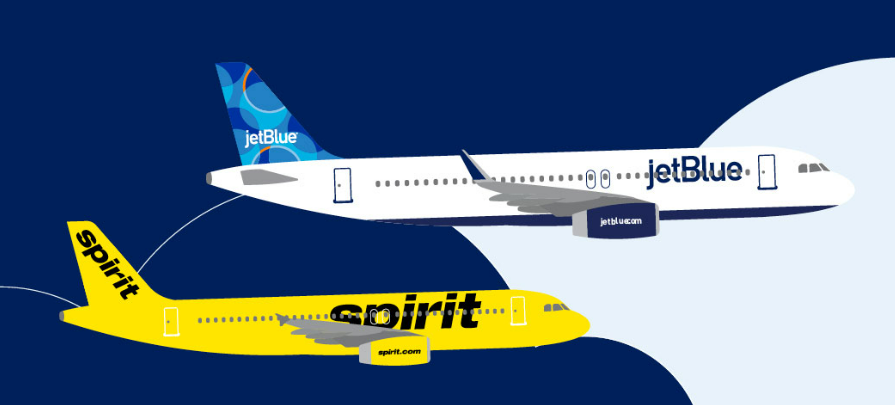JetBlue-Spirit merger would raise fares at two major Florida airports, lawsuit says

The JetBlue-Spirit Airlines merger, already under scrutiny by federal regulators, is the target of a lawsuit that seeks to kill the planned transaction.
The merger, which would eliminate Spirit, will hurt air travel throughout the country, the lawsuit alleges, and especially at Fort Lauderdale-Hollywood and Orlando international airports, where both airlines vigorously compete. Nineteen routes overlap in Fort Lauderdale and 12 in Orlando.
Spirit, which is headquartered in Broward County, is the No. 1 carrier at Fort Lauderdale-Hollywood International with a 30% market share. Jet Blue is the number two carrier with 19% market share, which means, between the two carriers, about half of all passengers use either airline. By comparison, Spirit's market share at nearby Palm Beach International is less than 1%; Jet Blue, at 27%, is the number one carrier.
“Orlando and Fort Lauderdale would be especially hurt,” said Joseph Alioto, the lead attorney for a group of travelers and travel agents who filed an antitrust federal lawsuit in December in the Northern District of California that challenges the merger and seeks an injunction to block it.
“The whole point is for JetBlue to save money, and they will do it by eliminating flights and by raising prices,” Alioto said.

The lawsuit calls Spirit “a significant price-cutting rival of JetBlue, as well as a rival of the legacy carriers and other low-cost carriers. Approving the merger would allow JetBlue to gain a majority market share on more than a dozen routes where neither it nor Spirit previously dominated and it would eliminate price-cutting by Spirit, the lawsuit alleges.
"The continued vigorous competition of Spirit is one of the few, if not the principal, remaining competitive forces in the market. Its continued existence in the market is needed to preserve and protect the minimal amount of competition that exists in the airline industry today," the lawsuit said.
"Indeed, if there is to be any restoration of competition in the airline industry, Spirit is the airline that will cause it."
The JetBlue-Spirit merger:The JetBlue-Spirit merger: How will it affect rates and routes at PBI and FLL airports?
One fewer flight:JetBlue cancels Palm Beach International Airport flight to Puerto Rico
'No-frills' option Spirit makes air travel affordable, lawsuit argues
In an interview with The Palm Beach Post, Alioto said Spirit’s no-frills flights allow travelers to fly at a fraction of the price that other airlines charge. Some non-stop Spirit flights are often available for as little as $50 one way from Florida to the Northeast. Critics, though, note that the price tag significantly rises if luggage is taken and seats are selected.
“The no-frills option should not be taken away,” Alioto said. “The traveler should decide whether he or she wants to pay for anything extra. Taking the option away will make it difficult for some people to even travel."
The lawsuit uses Spirit’s own words to make its case. When it supported a merger with Frontier Airlines, Spirit argued that federal regulators would never approve a JetBlue merger, Alioto noted, and that a merger with JetBlue would, indeed, lead to higher fares and would reduce low-cost airlines by 50%.
“Spirit made the case as to why it should not merge with JetBlue,” Alioto said.
Spirit initially sought to merge with Frontier but shareholders would not agree to accept Frontier's offer after JetBlue agreed to pay $3.8 billion for Spirit, $1 billion more than Frontier's offer.
To obtain the support of Spirit shareholders, the lawsuit says JetBlue offered them $400 million, money they could keep if the merger never happens. The lawsuit seeks to void the payment. The lawsuit calls the $400 million “hush money.”
“Spirit stands out as an airline that offers low fares, and, indeed, for a large number of people, the chance to use air travel at all," the lawsuit said. "Spirit is particularly well-positioned for the anticipated future post-COVID demand for air travel for business and pleasure. Spirit is on the rise. It is not a failing company. It is a rising star.”
JetBlue denies merger with Spirit would lead to higher air fares
JetBlue denies that.
Many of the same issues that the U.S. Justice Department is investigating are expected to be raised in the lawsuit Alioto has filed. The merger is expected to occur in 2024 if federal regulators approve it.
Alioto said his lawsuit will proceed independent of the Justice Department review. It is not clear whether the case will be heard before regulators arrive at their decision.
Efforts to obtain comment from Spirit and JetBlue were unsuccessful. But JetBlue’s website disputes the claim that the merger will lead to higher prices. It says the merger will create “a national, customer-centric, low-fare alternative to the dominant Big Four airlines."
The “JetBlue” effect decreases legacy fares by as much as 16% when JetBlue enters a legacy market, according to the airline.
Mike Diamond is a journalist at the Palm Beach Post, part of the USA TODAY Florida Network. He covers Palm Beach County government. You can reach him at mdiamond@pbpost.com. Help support local journalism. Subscribe today.
This article originally appeared on Palm Beach Post: JetBlue-Spirit merger would lead to higher air fares, lawsuit argues

